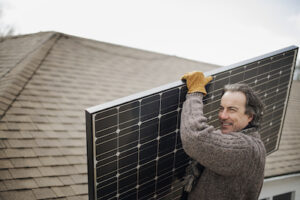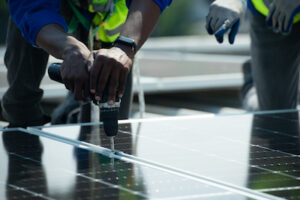Solar Panels For Your Home
Solar panels connect the sun’s energy, one of nature’s most potent and cost-free resources and then they transform that solar energy from the sun into electricity that can run your home. Some solar panel systems come with a solar battery as well, which can be used to store any additional solar energy the panels don’t consume right away. Not all panels have solar batteries installed with them. In actuality, most solar panel systems do not include batteries, though this is changing. So, with high-quality commercial solar panels becoming popular around the world, you may have been thinking about installing solar panels for your home. So how can you do so? The steps to follow if you want to install solar panels for your home include:
- Examine the Energy Efficiency of Your Home
- Do a Solar Potential Assessment
- Think About the Solar Energy Options
- Determine Your Solar Power Requirements
- Consult Solar Providers for Pricing and Reviews
- Installation and Utility Work Participation
You don’t need to be a technical expert to install Solar panels and reap their benefits. After the solar business installs the system, it works independently and doesn’t need the homeowner to be involved.

Steps to Install Solar Panels for Your Home
Your solar energy installer and your local utility provider can provide you with more details on the specific steps you must follow to power your home with solar energy. Some steps to install solar panels in your home are:
1. Try to Examine the Energy Efficiency of Your Home
Homeowners should look at their energy use and take into account any potential efficiency improvements before beginning the process of using solar energy to power their homes. Before deciding to go solar, homeowners should be well aware of their overall electricity usage and take into account simple, inexpensive efficiency improvements.
Examine All the Resources to Lower Your Electricity Usage:
– Home Energy Audits
A home energy audit can show you where your house is wasting energy and what you can do to make it more energy-efficient. Electronics and home appliances make better use of your devices or think about making an investment in highly efficient equipment.
– Lighting
Use energy-saving lighting, like LED lightbulbs. Heating and cooling requirements will have a big impact on how much solar energy you require if you use electricity to heat and cool your home. The quantity of electricity you want to generate with solar energy will be condensed by weatherizing your home and using energy-efficient heating and cooling.
2. Do a Solar Potential Assessment
Before selecting the most effective method for using solar panels at home, consider the amount of solar energy that might be produced at your address. For home solar electric systems, the solar resource is adequate because PV technologies harness both direct and indirect sunlight to produce electricity. However, how much electricity is generated there in it depends on how much solar radiation is received at a certain location and the size of the system. Several mapping websites and apps can help you determine your home’s solar energy potential.
The tools are a wonderful place to start and can help you figure out whether your home is suitable for solar electricity and, if not, what you need to do to keep enjoying the advantages of solar. Although the tools are helpful, they do not account for all the elements that must be taken into account for your individual system. Working closely with a solar installation that can precisely assess your solar potential and provide in-depth recommendations, estimates, and equipment knowledge will be necessary to achieve that.

3. Think About the Solar Energy Options
You no longer have to buy and build a system that you completely own and run if you want to switch to solar energy. Even if you rent your home or don’t want to own a rooftop system, you can use solar electricity thanks to a number of initiatives. You can also get some hands-on ideas about building an off-grid solar system.
4. Determine Your Solar Power Requirements
To help your contractor decide on the type and size of your system, gather information about your house and how much energy you consume. Examine your Solar panels’ power invoices to determine your annual electricity use. Your usage will be shown in kilowatt-hours. Review your usage every year because it may vary by month and you may use more or less electricity. A few utilities offer resources that can be of interest. If you keep making significant changes to improve the energy efficiency of your home, you might use less electricity.
5. Consult Solar Providers for Pricing and Reviews
Choose installers carefully who have the Certified Energy Practitioners certification, as this is the industry standard for certification in the solar industry. You may also read reviews online and ask friends and family who just switched to solar power for recommendations. Before making any Solar panel commitments, ask for proof of the installer’s license before working with them. Numerous web tools can be used to find and compare solar installers. To ensure that the quotes for the system installers are equal in terms of features and metrics, obtain several quotes.
When considering the cost of solar panels, it’s important to keep in mind that various factors can influence the final price, including system size, type, location, and installation fees. In general, the price of a residential solar panel system ranges from $10,000 to $30,000.
6. Installation and Utility Work Participation
If you decide to install a solar energy system, your installer should be able to help you with getting the necessary licenses and completing the necessary steps. Your installation will determine the best system size. The size will be determined by your electricity needs and the following elements:
- The solar resource or sunshine accessible at the location
- The tilt and orientation of the system
- The efficiency of the system in converting sunlight to power
- Other power sources, like utility, wind turbines, or a generator, use fossil fuels.

Your installer will also make sure that all of the equipment is placed appropriately. As making sure that it is tilted, and oriented in the right ways. This is in order to maximize the daily and seasonal solar energy received and produced by your system. Make sure you are familiar with billing, net metering, and any other utility fees you might have to pay.
Conclusion
So, these are the things that you need to find out and do so that you can start installing solar panels for your home. Hopefully, this helped you understand more about them. Thanks for reading!
